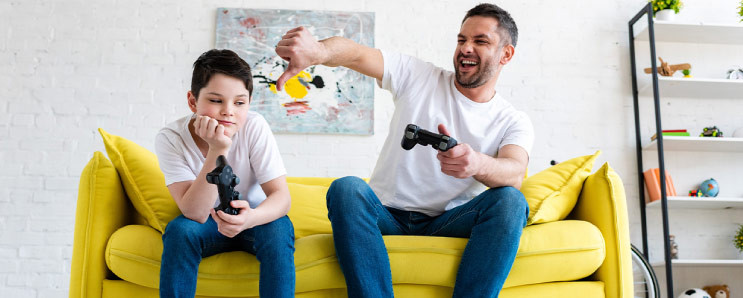Children rebelling against routine homework is a regular event in many homes. Some well-meaning parents will give in to the social expectations and simply shut down their children, or their responses. Some others will draw comparisons with Sharma Ji’s (neighbor’s) daughter and the rest will leave children with negative emotions altogether. Any of the above ways is not always the best one.
Emotion coach your children
Our children are growing up in an over-coached society. There are after-school coachings for dance, music, sports, art, percussion, martial arts and so on. In the post-pandemic times, there is no room for physically shuffling among classes. Shuffling screens have taken the center stage now. However, how to understand and handle big emotions is still the most neglected subject for coaching!

Research has proven that parents who follow the emotion coaching style raise children who are good learners and problem-solvers. Such children grow up as confident individuals. They also earn social acceptability quite easily.
Example case: So how do you handle your child who has returned from the playground looking quite miserable and has vouched to never again go there to play with friends? Your child narrates the ordeal: some children have booed him as he slipped on the wet football ground during the match.
A dismissing parent

- A dismissing parent will trivialize the child’s feelings. It’s no big deal. The child shouldn’t feel annoyed as it’s a petty matter.
- A dismissing parent will ignore the child’s feelings. The parent will not discuss the matter with the child.
- A dismissing parent will jump in to rescue the child from his negative emotions. The parent will try to douse the fire from outside without giving a thought about its impact on the child’s mind.
- A dismissing parent will not equip the child to handle a similar situation more efficiently in the future. Rather, the parent will try to fix the problem for the child. It will only make the child more underconfident.
- Since a dismissing parent will downplay events like the example case, it’s quite possible that in the future, the child may not be able to distinguish between a serious threat and a petty issue.
- A dismissing parent will not discuss the problem with the child and leave it on time and experience of the child to settle such matters. The parent will neither encourage the child to share views nor offer any solution, based on the ground reality.
A disapproving parent

- A disapproving parent will criticize the child for being a ‘cry baby’. The parent will tell the child to aggressively deal with bullying children.
- A disapproving parent will judge the emotion of the child. It will be looked at either as an attention-seeking attitude or a manipulative tactic to skip the routine.
- A disapproving parent believes that whining or crying is a sign of weakness. Such negative emotions should be controlled by toughening up the child from the inside.
- Now there may be two outcomes of the decision to toughen up the child. The parent may enroll the child in a meditation program for kids. Or, the child may be enrolled in a martial arts class. The problem with enrolling in the martial arts class is that the child will start to believe that showing emotions is a sign of weakness.
- There is a high chance that such children will grow up as emotionally insensitive adults. A disapproving parent believes that it is a waste of time to focus on negative emotions. Such emotions are unproductive.
A laissez-faire parent

- Laissez-faire or permissive parent will accept the big emotions of a child more freely. The child is allowed to behave without any control or guidance. The parent may also not check the offending behavior of the child.
- Since a laissez-faire parent doesn’t set limits, the child fails to understand where to draw the line. It may give rise to unpleasant situations. In the example case, probably children who were booing the child were brought up by extremely indulgent parents.
- A permissive parent will listen to the child and let him pour out his heart. However, the parent will seldom share some insight or offer some solution because the parent believes that the only way to deal with negative emotions is to ride them out.
- The child will feel much relieved. However, he will not learn how to manage his emotions and deal with such tricky situations more smartly.
- A laissez-faire parent believes that one should vent out negative emotions. As the parent fails to help the child find a solution, the latter may grow up as a person, deeply enmeshed in his thoughts, often having no clue on how to come out of the world of his thoughts.
An emotion coach

- Emotion coach parenting style sees an opportunity for intimacy during an emotional crisis of the child. The parent will sit with the child and discuss the problem. The parent will comfort the child with loving physical intimacy.
- The parent will listen to, empathize and validate the child’s feelings. The parent will always value the child’s opinions.
- The parent will never mock the child’s feelings. The parent will never downplay the situation.
- The parent will help the child to label his feelings. The parent may agree with or may not, but will never impose his own opinions on the child.
- The parent and the child will team up to brainstorm better options for dealing with similar situations in the future. They will also discuss the methods of controlling emotions. The parent will set acceptable limits of expression so that the child will not turn insolent and respond rudely.
Most parents want the best for their children. Hence, we cannot label parents in simple terms like good or bad parents. However, some parenting styles are more effective than the rest. To implement more effective parenting styles, it is important to know your child. Here is to happy parenting…Hip, hip, hurray!












